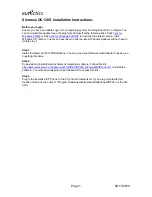
69
P
packages
groups, 35
selecting, 35
installing, 35
selecting, 35
partition
extended, 56
partitioning, 22
automatic, 19, 20
basic concepts, 53
creating new, 26
file system type, 27
extended partitions, 56
how many partitions, 60
introduction to, 55
making room for partitions, 57
mount points and, 59
naming partitions, 58
numbering partitions, 58
other operating systems, 59
recommended, 25
types of partitions, 56
using free space, 57
using unused partition, 58
password
setting root, 33
pSeries
booting the installation program, 8
pSeries rescue mode, 42
R
recursion
(See recursion)
registering your product, 1
rescue mode, iSeries, 42
accessing SCSI utilities, 42
rescue mode, pSeries, 42
root / partition
recommended partitioning, 25
root password, 33
S
selecting
packages, 35
starting
installation, 12
steps
disk space, 2
installing with CD-ROM, 3
iSeries hardware preparation, 1
swap parition
recommended partitioning, 25
T
TCP/IP configuration, 14
time zone
configuration, 32
traceback messages
saving traceback messages without a floppy drive,
48
troubleshooting, 47
after the installation
Apache-based httpd service hangs during
startup, 52
after the installation, 50
booting into a graphical environment, 51
booting into GNOME or KDE, 51
booting into the X Window System, 51
logging in, 52
printers, 52
Sendmail hangs during startup, 52
unable to IPL from *NWSSTG, 50
X (X Window System), 51
beginning the installation, 48
mouse not detected, 48
booting, 47
signal 11 error, 47
during the installation
No devices found to install Red Hat Enterprise
Linux error message, 48
saving traceback messages without a diskette
drive, 48
during the installation, 48
completing partitions, 49
partition tables, 49
Python errors, 49
U
upgrade
(See migration, software)
user interface, graphical
installation program, 7
user interface, text mode
installation program, 10
V
video card, 37
virtual consoles, 9




































